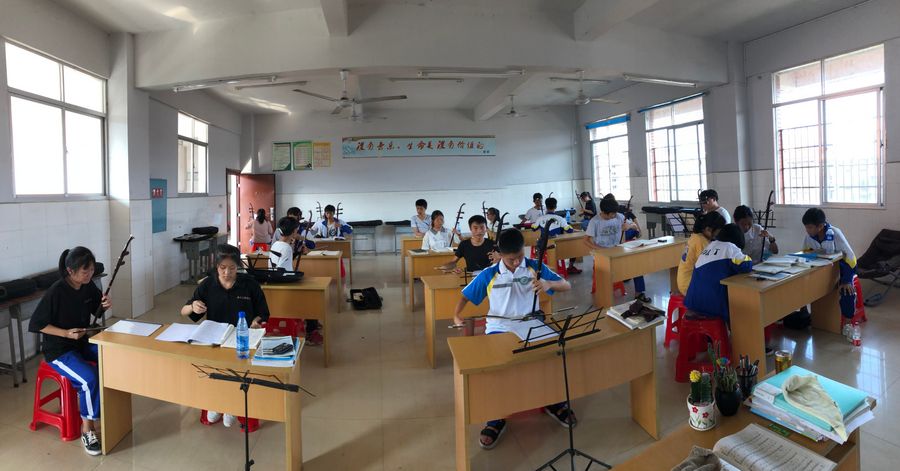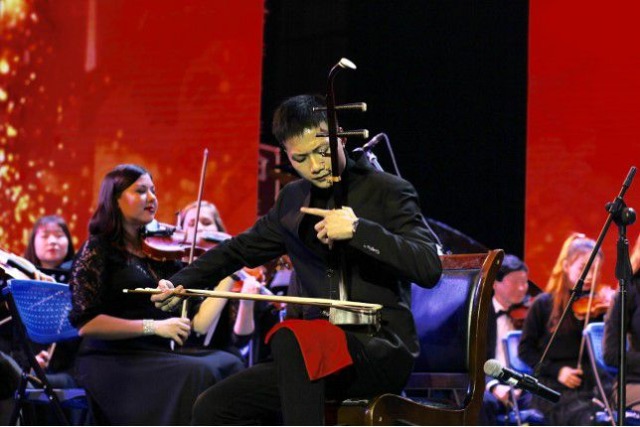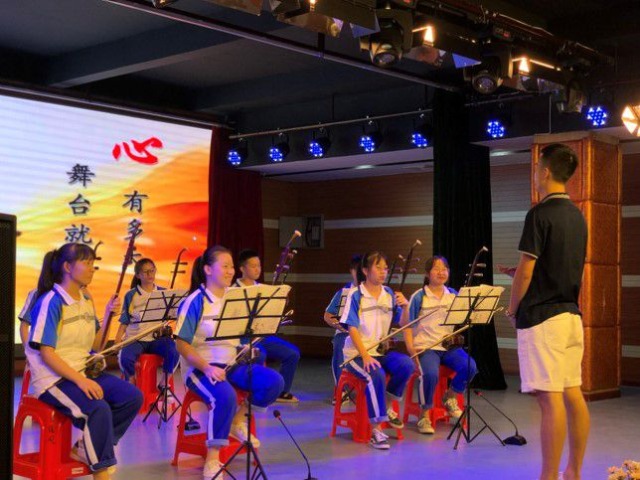Poverty-stricken county leaves no student behind
Xinhua,February 19, 2020 Adjust font size:

Students learn to play erhu (a traditional Chinese instrument) at a middle school in Luxi, a county in central China's Hunan Province, Sept. 5, 2019. (Provided to Xinhua)
"In the past, my dream was to shine on the stage, now my dream is to let more children leave the mountains and embrace a better future," said Dai, who teaches music in a poverty-stricken county.
Dai Fa, 26, could have been a folk musician, but he stepped off the stage and chose to teach in his mountainous hometown.
Dai is a music teacher of a middle school in Luxi, a county in central China's Hunan Province with 62.3 percent of the ethnic minority population. It is one of the 11 national-level deep poverty-stricken counties in the province.
Like many remote areas, Luxi saw an outflow of talent, who are attracted by the opportunities in cities. The local education faced a grave situation with teachers leaving and young talent reluctant to come.
As a Luxi native, Dai had never planned to return to his hometown before graduating from university.
"When I was a child, the development of education in my hometown was lagging behind," Dai said. The poverty and lack of educational resources in Luxi made him eager to leave there and earn a living in big cities.

Dai Fa performs with the symphony orchestra from Ukraine at a concert hall in Changsha, central China's Hunan Province, Dec. 13, 2019. (Provided to Xinhua)
After graduating from the Tianjin Conservatory of Music in 2018, he got a job as an erhu (a traditional Chinese instrument) performer in a song and dance troupe in Hunan.
Tan Zihao, director of Luxi's education bureau, watched one of Dai's performances and was deeply impressed. After many attempts, Tan later managed to persuade Dai to return to Luxi to help develop the local education.
Many of Dai's students had only seen an erhu and cello that he brought to the school on TV before, and they were very excited to learn how to play them.
"The spark in their eyes reminded me of myself in the high school," Dai said.
"The faculty is the key to education. Only by keeping them can we help more people get out of the mountains, broaden their horizons to develop local industries, and eradicate poverty from the roots," said Du Xiaoyong, the county's Party chief.
To balance teaching resources between urban and rural areas, Luxi established a mechanism to award and select academic leaders in favor of rural teachers and encourage urban teachers to work in rural schools.
The local government also offers the teachers monthly subsidies as well as free apartments or low-rent housing.

Dai Fa and students perform at a middle school in Luxi, a county in central China's Hunan Province, Sept. 1, 2019. (Provided to Xinhua)
To ensure that education reaches even the most remote villages, the county has set up "teaching sites," schools with few teachers and students, in almost all the villages in the county.
"As long as there is one student, there will be a teacher there," Tan, the education official, said.
Yang Shuqing, the only teacher in a school at Dengyun village of Heshui Town, has been working there for 10 years. At present, there are 15 preschool students, three first-graders and four second-graders.
The students from two villages in a nearby county also come to the school because of the good campus environment and teaching quality.
"Although they are far away from the county, my students never score below 80 out of 100 on a test," said Yang. "As a teacher, this is my greatest pride."
To show their gratitude, the students often bring her homemade food and specialties, Yang said, adding that the recognition from students and parents is the most valuable gift.
"In the past, my dream was to shine on the stage, now my dream is to let more children leave the mountains and embrace a better future," Dai said.
79dc21c2-4681-4f1f-aacf-43cb63df519e.jpg)
